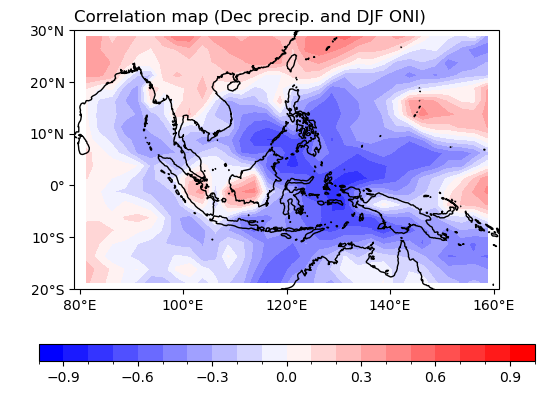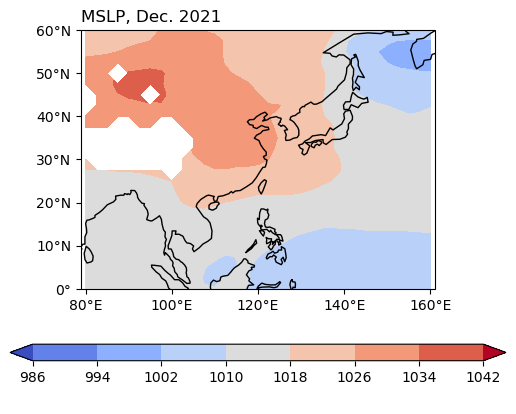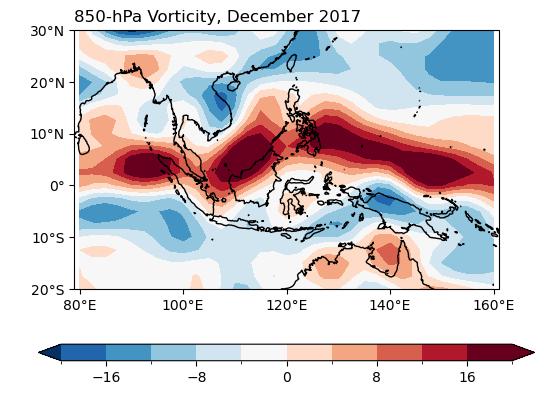7. 進階運算與統計方法#
網格重建 (Regridding)#
線性內插 (Linear Interpolation)#
不同的資料通常有不同的時間和網格解析度,根據需求有時需要將資料A資料內插到資料B的網格上。xarray.DataArray 和xarray.Dataset 有內建網格內插的方法xr.interp,請見以下範例。
Example 1: GPCP降雨資料網格解析度為2.5度,OLR網格資料解析度為1度,欲將OLR資料內插到GPCP資料網格上。
import xarray as xr
lats = -20
latn = 30
lon1 = 79
lon2 = 161
pcp_ds = xr.open_dataset('data/gpcp_precip_1979-2019.pentad.nc')
pcp = pcp_ds.sel(lat=slice(latn,lats), lon=slice(lon1,lon2)).data
olr_ds = xr.open_dataset('data/olr.nc')
olr = olr_ds.sel(lat=slice(lats,latn), lon=slice(lon1,lon2)).olr
olr_rmp = olr.interp(lon=pcp.lon, lat=pcp.lat) # 利用interp的method進行網格內插。
olr_rmp
<xarray.DataArray 'olr' (time: 8760, lat: 20, lon: 32)> Size: 22MB
array([[[210.37125, 199.29874, 197.44077, ..., 268.05853, 268.25916,
266.9823 ],
[204.61313, 213.93433, 230.92719, ..., 284.24072, 282.60632,
278.35385],
[236.69272, 247.62692, 259.35587, ..., 294.86554, 292.45862,
292.01804],
...,
[297.27472, 302.5027 , 305.18634, ..., 193.11395, 206.42505,
197.59212],
[291.31464, 291.11176, 298.43726, ..., 155.4393 , 146.58469,
162.1478 ],
[286.89136, 290.6887 , 291.20618, ..., 171.58977, 183.45123,
195.39035]],
[[259.8478 , 225.8486 , 211.98647, ..., 269.50348, 269.39746,
272.64 ],
[276.39136, 272.1738 , 268.95856, ..., 291.94778, 289.79297,
284.37097],
[260.77368, 265.89886, 275.41898, ..., 301.7583 , 299.66028,
292.9348 ],
...
[289.9028 , 281.8377 , 285.37466, ..., 169.81645, 173.29109,
213.98285],
[286.0285 , 282.36426, 284.31454, ..., 111.96492, 154.03249,
224.03793],
[290.05353, 295.02466, 291.87067, ..., 125.69296, 153.77583,
191.87067]],
[[240.00652, 211.87251, 198.56546, ..., 264.23984, 258.3333 ,
255.25803],
[224.23218, 243.02698, 246.38681, ..., 279.6334 , 274.43097,
277.21472],
[234.04726, 253.98969, 263.0449 , ..., 289.64203, 291.71185,
293.91864],
...,
[286.8454 , 287.29822, 284.08643, ..., 165.07278, 165.68568,
180.77968],
[291.43097, 289.64923, 295.36426, ..., 178.16243, 158.17258,
182.52911],
[294.91678, 297.96875, 296.73392, ..., 174.35318, 157.13422,
152.69089]]], dtype=float32)
Coordinates:
* time (time) datetime64[ns] 70kB 1998-01-01 1998-01-02 ... 2021-12-31
* lon (lon) float32 128B 81.25 83.75 86.25 88.75 ... 153.8 156.2 158.8
* lat (lat) float32 80B 28.75 26.25 23.75 21.25 ... -13.75 -16.25 -18.75
Attributes:
standard_name: toa_outgoing_longwave_flux
long_name: NOAA Climate Data Record of Daily Mean Upward Longwave Fl...
units: W m-2
cell_methods: time: mean area: mean保守網格重建 (conservative regridding)#
然而,有時線性內插並不是最好的網格重建方式。例如降雨資料在網格重建前後,應該要遵守降雨量守恆,因此需使用 保守網格重建 (conservative regridding) 。這裡我們介紹xesmf套件來計算網格重建
Example 2: 將GCPC資料內插到OLR資料網格上。
import xesmf as xe
# Set the grid information
grid_olr = xr.Dataset({'lat':olr.lat, 'lon':olr.lon})
grid_gpcp = xr.Dataset({'lat':pcp.lat, 'lon':pcp.lon})
# ds_in: the input grid info;
# ds_out: the output grid info
regridder = xe.Regridder(ds_in=grid_gpcp , ds_out=grid_olr, method="conservative_normed")
pcp_rg = regridder(pcp,keep_attrs=True)
---------------------------------------------------------------------------
KeyError Traceback (most recent call last)
Cell In[2], line 1
----> 1 import xesmf as xe
3 # Set the grid information
4 grid_olr = xr.Dataset({'lat':olr.lat, 'lon':olr.lon})
File /data/wtsai/micromamba/p3t/lib/python3.10/site-packages/xesmf/__init__.py:3
1 # flake8: noqa
----> 3 from . import data, util
4 from .frontend import Regridder, SpatialAverager
6 try:
File /data/wtsai/micromamba/p3t/lib/python3.10/site-packages/xesmf/util.py:8
5 from shapely.geometry import MultiPolygon, Polygon
7 try:
----> 8 import esmpy as ESMF
9 except ImportError:
10 import ESMF
File /data/wtsai/micromamba/p3t/lib/python3.10/site-packages/esmpy/__init__.py:106
104 __requires_python__ = msg["Requires-Python"]
105 # these don't seem to work with setuptools pyproject.toml
--> 106 __author__ = msg["Author"]
107 __homepage__ = msg["Home-page"]
108 __obsoletes__ = msg["obsoletes"]
File /data/wtsai/micromamba/p3t/lib/python3.10/site-packages/importlib_metadata/_adapters.py:101, in Message.__getitem__(self, item)
99 res = super().__getitem__(item)
100 if res is None:
--> 101 raise KeyError(item)
102 return res
KeyError: 'Author'
.coarsen()#
Example 3: 將每日OLR轉換成侯(pentad)平均資料,意即將時間解析度調整為5天一次。
olr_noleap = olr.sel(time=~((olr.time.dt.month == 2) & (olr.time.dt.day == 29)))
olr_ptd = (olr_noleap.coarsen(time=5,
coord_func={"time": "min"})
.mean())
olr_ptd
<xarray.DataArray 'olr' (time: 1752, lat: 50, lon: 82)> Size: 29MB
array([[[284.27383, 285.73615, 288.25266, ..., 231.88799, 241.6569 ,
249.84024],
[286.65228, 288.0508 , 288.27435, ..., 215.95383, 230.82944,
246.1481 ],
[290.7838 , 290.2586 , 287.82904, ..., 198.27681, 214.98921,
225.9622 ],
...,
[247.29614, 246.06245, 247.9498 , ..., 279.0298 , 277.99088,
276.57684],
[244.55948, 242.81021, 239.57669, ..., 273.2099 , 271.63373,
270.99365],
[236.1903 , 229.96805, 221.43008, ..., 266.5147 , 266.81476,
266.7093 ]],
[[257.097 , 249.0689 , 260.7727 , ..., 251.24785, 258.4394 ,
267.57504],
[265.49664, 263.9062 , 270.4431 , ..., 237.29636, 248.2174 ,
250.10226],
[261.7508 , 266.22888, 276.74783, ..., 222.4416 , 235.64157,
227.53247],
...
[246.52588, 246.06046, 249.06099, ..., 256.54034, 259.21564,
260.40427],
[244.2377 , 247.02632, 246.57185, ..., 258.28464, 255.90445,
257.71054],
[237.54703, 235.23251, 224.96394, ..., 255.28891, 253.66435,
255.53586]],
[[286.864 , 287.83688, 290.30945, ..., 194.66502, 212.79057,
210.36748],
[288.31 , 288.92453, 290.12537, ..., 204.64694, 225.9674 ,
223.37724],
[284.80383, 288.20563, 289.7766 , ..., 215.14029, 236.13554,
232.43852],
...,
[236.44717, 236.95544, 234.64787, ..., 268.50082, 268.91937,
267.25333],
[235.04623, 231.87952, 229.08992, ..., 267.69647, 267.49542,
266.0851 ],
[233.44182, 225.93411, 211.10928, ..., 268.23108, 265.9177 ,
264.84662]]], dtype=float32)
Coordinates:
* time (time) datetime64[ns] 14kB 1998-01-01 1998-01-06 ... 2021-12-27
* lon (lon) float32 328B 79.5 80.5 81.5 82.5 ... 157.5 158.5 159.5 160.5
* lat (lat) float32 200B -19.5 -18.5 -17.5 -16.5 ... 26.5 27.5 28.5 29.5
Attributes:
standard_name: toa_outgoing_longwave_flux
long_name: NOAA Climate Data Record of Daily Mean Upward Longwave Fl...
units: W m-2
cell_methods: time: mean area: mean也就是在時間的維度上,5天為一個單位平均。 coord_func 預設為 mean,也就是重新取樣後的座標 (時間) 軸會選擇5天平均後的時間軸 (如1998-01-03, 1998-01-08, 1998-01-13, …),其他選項可選 min 設定為最小值 (一侯的開始日) 或 max 最大值 (一侯的結束日)。
Note: 雖然xarray.DataArray.resample看似也有同樣功能,但根據API reference,
The resampled dimension must be a datetime-like coordinate.
根據以上範例,就是 olr_ptd = olr_noleap.resample(time='5D') ,然而datetime 物件無法選擇日曆格式,也就是在計算五天平均時,不論原始資料 olr_noleap 有沒有2/29,這個方法都會納入2/29 (延伸閱讀:StackOverflow 的問答)。
Exercise
請利用coarsen改變空間的解析度 (i.e. 將1˚解析度的OLR資料regrid成2˚解析度)。
滑動平均 (running mean)#
可利用 xarray.DataArray.rolling,連續選擇3個單位,再進行平均。
olr_3p_runave = (olr_ptd.rolling(time=3, # 選擇幾個時間單位
center=False)
.mean())
olr_3p_runave
<xarray.DataArray 'olr' (time: 1752, lat: 50, lon: 82)> Size: 29MB
array([[[ nan, nan, nan, ..., nan, nan,
nan],
[ nan, nan, nan, ..., nan, nan,
nan],
[ nan, nan, nan, ..., nan, nan,
nan],
...,
[ nan, nan, nan, ..., nan, nan,
nan],
[ nan, nan, nan, ..., nan, nan,
nan],
[ nan, nan, nan, ..., nan, nan,
nan]],
[[ nan, nan, nan, ..., nan, nan,
nan],
[ nan, nan, nan, ..., nan, nan,
nan],
[ nan, nan, nan, ..., nan, nan,
nan],
...
[258.01865, 258.54132, 260.59457, ..., 265.62262, 266.46997,
267.72852],
[254.52092, 255.43341, 253.74515, ..., 262.07703, 262.12787,
264.36252],
[249.05486, 243.50095, 230.53357, ..., 257.8312 , 259.1329 ,
259.55786]],
[[285.45612, 286.57214, 287.6652 , ..., 247.677 , 257.28473,
259.3609 ],
[288.13184, 288.3128 , 289.0145 , ..., 255.27068, 264.8253 ,
264.77902],
[288.0848 , 289.45697, 289.93057, ..., 261.4938 , 269.81818,
268.2691 ],
...,
[248.90976, 249.10083, 250.33572, ..., 262.9018 , 263.4146 ,
263.58185],
[247.00436, 247.02068, 245.05011, ..., 261.76514, 261.24374,
261.8905 ],
[243.24814, 237.90851, 224.16135, ..., 258.3669 , 257.77066,
257.97882]]], dtype=float32)
Coordinates:
* time (time) datetime64[ns] 14kB 1998-01-01 1998-01-06 ... 2021-12-27
* lon (lon) float32 328B 79.5 80.5 81.5 82.5 ... 157.5 158.5 159.5 160.5
* lat (lat) float32 200B -19.5 -18.5 -17.5 -16.5 ... 26.5 27.5 28.5 29.5
Attributes:
standard_name: toa_outgoing_longwave_flux
long_name: NOAA Climate Data Record of Daily Mean Upward Longwave Fl...
units: W m-2
cell_methods: time: mean area: mean由於頭尾會有缺失值NaN,可加上dropna()移除之。
相關係數地圖 (correlation map)#
給定兩個DataArray,我們就可以計算兩者之間沿著特定座標軸 (e.g. 沿著時間軸的) 的相關係數。
Example 4: 計算NDJ Oceanic Niño Index (ONI) 和十二月降雨的相關係數地圖。
Step 1: 得到GPCP十二月平均資料 (先所有選12月資料,再用groupby)
pcp_dec = (pcp.sel(time=pcp.time.dt.month.isin([12]))
.groupby('time.year')
.mean("time"))
pcp_dec
<xarray.DataArray 'data' (year: 41, lat: 20, lon: 32)> Size: 105kB
array([[[1.0133333e+00, 9.1833329e-01, 7.9833335e-01, ...,
3.6333334e+00, 2.7116668e+00, 2.5383332e+00],
[2.0333333e-01, 4.2833331e-01, 2.5000000e-01, ...,
2.4483333e+00, 2.3216665e+00, 1.7766665e+00],
[5.4999996e-02, 1.3666667e-01, 1.5833335e-01, ...,
2.2033336e+00, 1.8683332e+00, 1.2850000e+00],
...,
[1.1466666e+00, 1.4949999e+00, 1.8333334e+00, ...,
3.6483333e+00, 4.2433333e+00, 2.9916668e+00],
[7.1833330e-01, 1.3866667e+00, 1.4466667e+00, ...,
4.0750003e+00, 3.2466669e+00, 2.8599999e+00],
[3.9666665e-01, 8.2333332e-01, 1.1883334e+00, ...,
2.9016666e+00, 2.7083333e+00, 1.7416667e+00]],
[[4.6500000e-01, 2.8333333e-01, 3.4333333e-01, ...,
3.8716667e+00, 3.8799999e+00, 3.4633334e+00],
[6.0833335e-01, 1.7000000e-01, 1.4666666e-01, ...,
3.9750001e+00, 3.6300001e+00, 3.1483333e+00],
[1.2800001e+00, 3.2166669e-01, 1.2000000e-01, ...,
2.4466667e+00, 2.1550000e+00, 1.1616668e+00],
...
[7.9235015e+00, 7.0794005e+00, 5.7172127e+00, ...,
9.7668800e+00, 1.0939357e+01, 1.0846936e+01],
[9.5492640e+00, 7.4848499e+00, 3.3095343e+00, ...,
1.2228072e+01, 1.2528176e+01, 1.1302447e+01],
[7.2531962e+00, 5.3915715e+00, 2.0546637e+00, ...,
1.0486613e+01, 1.3482674e+01, 1.1387763e+01]],
[[2.0096309e+00, 1.1509016e+00, 4.8980752e-01, ...,
2.0202532e+00, 2.7056713e+00, 2.6676538e+00],
[1.2896461e+00, 1.1470729e+00, 2.6983759e-01, ...,
1.3239046e+00, 1.6525987e+00, 1.6284056e+00],
[8.9463830e-01, 3.9747801e-01, 1.5476857e-01, ...,
1.1533502e+00, 1.1403440e+00, 9.9328095e-01],
...,
[1.2956619e+00, 6.6536534e-01, 5.8920252e-01, ...,
4.1320643e+00, 4.3791137e+00, 4.1250496e+00],
[1.7519032e+00, 1.2151116e+00, 9.6764684e-01, ...,
5.1612849e+00, 5.1797566e+00, 2.8651981e+00],
[3.1523111e+00, 2.0467207e+00, 1.0773114e+00, ...,
3.6295269e+00, 4.3244128e+00, 2.4604805e+00]]], dtype=float32)
Coordinates:
* lon (lon) float32 128B 81.25 83.75 86.25 88.75 ... 153.8 156.2 158.8
* lat (lat) float32 80B 28.75 26.25 23.75 21.25 ... -13.75 -16.25 -18.75
* year (year) int64 328B 1979 1980 1981 1982 1983 ... 2016 2017 2018 2019
Attributes:
long_name: GPCP pentad precipitation (mm/day)
units: mm/dayStep 2: 製造NDJ ONI index矩陣。
oni_ndj = xr.DataArray(
data=[0.6, 0.0, -0.1, 2.2, -0.9, -1.1, -0.4, 1.2, 1.1, -1.8, -0.1, 0.4,
1.5, -0.1, 0.1, 1.1, -1.0, -0.5, 2.4, -1.6, -1.7, -0.7,
-0.3, 1.1, 0.4, 0.7, -0.8, 0.9, -1.6, -0.7, 1.6, -1.6,
-1.0, -0.2, -0.3, 0.7, 2.6, -0.6, -1.0, 0.8, 0.5],
dims='year',
coords=dict(year=pcp_dec.year)
)
oni_ndj
<xarray.DataArray (year: 41)> Size: 328B
array([ 0.6, 0. , -0.1, 2.2, -0.9, -1.1, -0.4, 1.2, 1.1, -1.8, -0.1,
0.4, 1.5, -0.1, 0.1, 1.1, -1. , -0.5, 2.4, -1.6, -1.7, -0.7,
-0.3, 1.1, 0.4, 0.7, -0.8, 0.9, -1.6, -0.7, 1.6, -1.6, -1. ,
-0.2, -0.3, 0.7, 2.6, -0.6, -1. , 0.8, 0.5])
Coordinates:
* year (year) int64 328B 1979 1980 1981 1982 1983 ... 2016 2017 2018 2019Step 3: 用xr.corr計算相關係數。
corr = xr.corr(pcp_dec,oni_ndj,dim='year')
corr
<xarray.DataArray (lat: 20, lon: 32)> Size: 5kB
array([[ 3.62929452e-01, 3.42366940e-01, 1.36141381e-01,
2.86181877e-01, 1.81635011e-01, 1.49191935e-01,
2.91984738e-01, 4.77790090e-01, 4.72934980e-01,
2.59950214e-01, 3.45925708e-01, 3.45836394e-01,
2.41839291e-01, 3.26920710e-01, 3.12002374e-01,
2.78955901e-01, 2.83943380e-01, 3.95803478e-01,
4.20742082e-01, 4.71375054e-01, 5.46175408e-01,
4.34086513e-01, 3.36992606e-01, 2.34458541e-01,
3.30061218e-01, 2.83089068e-01, 6.62670164e-02,
-6.41038383e-02, -8.02357126e-02, -1.32435603e-01,
-6.14116577e-02, -3.57627814e-01],
[ 3.83909992e-01, 3.03894569e-01, 2.37785616e-01,
2.14941985e-01, 1.29919746e-01, 9.02064270e-02,
1.65142441e-01, 2.02511225e-01, 2.68816760e-01,
1.56273306e-01, 2.46169172e-01, 3.13843032e-01,
3.71282408e-01, 3.76425080e-01, 3.56976471e-01,
3.31840158e-01, 1.84695348e-01, 4.19843103e-01,
4.71277802e-01, 4.27318315e-01, 3.51365941e-01,
2.37002936e-01, 2.34139483e-01, 2.04142669e-01,
1.27191143e-01, -7.16084696e-02, -1.17030947e-01,
...
-1.63141768e-01, 2.02073897e-02, 8.64961746e-02,
-6.46166022e-02, -1.30967877e-01, -1.11179142e-01,
-2.19488532e-01, -3.89394358e-01, -5.41138822e-01,
-5.55411026e-01, -4.62892792e-01, -3.87886292e-01,
-2.86447705e-01, -1.87858258e-01, -4.88526454e-02,
-6.03390847e-02, -5.92937090e-02, -1.09022036e-02,
-1.62940957e-01, -1.06521335e-01, -1.63654755e-01,
-2.66138359e-01, -3.63495708e-01, -3.56191141e-01,
-3.43018577e-01, -4.02329768e-01],
[ 2.18229674e-01, 1.50764053e-01, 4.34983986e-02,
-2.31485323e-02, -1.24680824e-01, -2.82829682e-01,
-2.27022130e-01, -1.80625258e-01, -6.68313221e-02,
-1.22718863e-01, -7.70160205e-02, -1.92838402e-01,
-2.63437027e-01, -4.77678622e-01, -6.13706400e-01,
-5.25689477e-01, -3.34162312e-01, -3.46265756e-01,
-2.73299118e-01, -3.36175549e-01, -1.75612517e-01,
-7.18667375e-02, -2.45879325e-02, 2.50092056e-03,
-1.46619847e-01, -7.41479127e-02, -3.23609552e-02,
-1.90437815e-01, -2.59385858e-01, -3.08636758e-01,
-2.93624427e-01, -3.09437346e-01]])
Coordinates:
* lon (lon) float32 128B 81.25 83.75 86.25 88.75 ... 153.8 156.2 158.8
* lat (lat) float32 80B 28.75 26.25 23.75 21.25 ... -13.75 -16.25 -18.75Step 4: 將計算好的結果畫出來看看。
import numpy as np
from cartopy import crs as ccrs
from cartopy.mpl.gridliner import LONGITUDE_FORMATTER, LATITUDE_FORMATTER
import matplotlib as mpl
from matplotlib import pyplot as plt
mpl.rcParams['figure.dpi'] = 100
proj = ccrs.PlateCarree()
fig, ax = plt.subplots(1,1,subplot_kw={'projection':proj})
clevs = np.arange(170,350,20)
# 繪圖
plt.title("Correlation map (Dec precip. and DJF ONI)", loc='left') # 設定圖片標題,並且置於圖的左側。
olrPlot = (corr.plot.contourf("lon", "lat",
ax=ax,
levels=np.arange(-1,1.1,0.1),
cmap='bwr',
add_colorbar=True,
extend='neither',
cbar_kwargs={'orientation': 'horizontal', 'aspect': 30, 'label': ' '}) #設定color bar
)
ax.set_extent([lon1,lon2,lats,latn],crs=proj)
ax.set_xticks(np.arange(80,180,20), crs=proj)
ax.set_yticks(np.arange(-20,40,10), crs=proj)
lon_formatter = LONGITUDE_FORMATTER
lat_formatter = LATITUDE_FORMATTER
ax.xaxis.set_major_formatter(lon_formatter)
ax.yaxis.set_major_formatter(lat_formatter)
ax.coastlines()
ax.set_ylabel(' ') # 設定坐標軸名稱。
ax.set_xlabel(' ')
plt.show()

where條件控制#
where是一個很好用的方法,可以針對資料設定條件進行篩選和過濾。我們直接看以下例子:
Example 4: 繪製2021年12月平均之Mean Sea Level Pressure,但海拔3000公尺以上的區域不畫。
Step 1: 讀MSLP、地形資料。
lats=0
latn=60
topo_ds = xr.open_dataset('data/etopo5.nc')
mslp_ds = xr.open_dataset('data/mslp.2021.nc')
topo = topo_ds.sel(Y=slice(lats,latn),
X=slice(lon1,lon2)).bath
mslp = mslp_ds.sel(time=slice('2021-12-01','2021-12-31'),
lat=slice(latn,lats),
lon=slice(lon1,lon2)).mslp
mslp = mslp/100.
where的原理是搜尋兩者相對應的網格是否滿足給定的控制條件 (以這個範例來說是搜尋topo >= 3000的網格點),但兩者網格解析度不同時,沒有辦法比較。因此必須先進行網格內插,讓topo和mslp的解析度相同。
topo_rmp = topo.interp(X=mslp.lon, Y=mslp.lat)
接著用where設定條件:
mslp_mask = mslp.where(topo_rmp<=3000)
mslp_mask
<xarray.DataArray 'mslp' (time: 31, lat: 25, lon: 33)> Size: 102kB
array([[[1013.425, 1015.375, 1017.25 , ..., 1015.8 , 1015.5 ,
1015.45 ],
[1019.35 , 1020.625, 1021.65 , ..., 1009.975, 1012.825,
1015.25 ],
[1023.575, 1024.4 , 1025.175, ..., 1008.025, 1013.475,
1017.35 ],
...,
[1010.3 , 1009.675, 1008.85 , ..., 1006.8 , 1007.1 ,
1007.05 ],
[1010.15 , 1009.875, 1009.05 , ..., 1006.775, 1007.25 ,
1007.125],
[1010.075, 1009.9 , 1009.175, ..., 1007.15 , 1007.35 ,
1007.275]],
[[1003.85 , 1006.025, 1008.05 , ..., 983.225, 983.4 ,
984.375],
[1010.625, 1012.975, 1015.025, ..., 974.25 , 978.325,
981.95 ],
[1015.5 , 1017.675, 1019.55 , ..., 976.95 , 981.475,
985.325],
...
[1011.025, 1010.875, 1010.8 , ..., 1008.775, 1008.8 ,
1008.825],
[1010.625, 1010.525, 1010.65 , ..., 1009.075, 1008.9 ,
1008.65 ],
[1011.025, 1010.85 , 1010.825, ..., 1008.475, 1008.325,
1008.75 ]],
[[1024.175, 1025.275, 1026.675, ..., 1019.775, 1019.725,
1019.45 ],
[1029.125, 1029.8 , 1030.6 , ..., 1006.275, 1007.75 ,
1010. ],
[1034.4 , 1034.875, 1035.45 , ..., 995.475, 997.3 ,
1000.925],
...,
[1011.825, 1011.275, 1010.975, ..., 1009.225, 1009.4 ,
1009.475],
[1011.55 , 1011. , 1010.475, ..., 1008.975, 1009.125,
1008.975],
[1011.575, 1011.275, 1010.925, ..., 1008.9 , 1009.2 ,
1009.025]]], dtype=float32)
Coordinates:
* lat (lat) float32 100B 60.0 57.5 55.0 52.5 50.0 ... 7.5 5.0 2.5 0.0
* lon (lon) float32 132B 80.0 82.5 85.0 87.5 ... 152.5 155.0 157.5 160.0
* time (time) datetime64[ns] 248B 2021-12-01 2021-12-02 ... 2021-12-31
X (lon) float32 132B 80.0 82.5 85.0 87.5 ... 152.5 155.0 157.5 160.0
Y (lat) float32 100B 60.0 57.5 55.0 52.5 50.0 ... 7.5 5.0 2.5 0.0我們設定的條件就是topo<=3000,不滿足的會直接被設定為缺失值。也可以在where的引數other中,設定當不滿足條件時要代入的值。
proj = ccrs.PlateCarree()
fig, ax = plt.subplots(1,1,subplot_kw={'projection':proj})
# 繪圖
plt.title("MSLP, Dec. 2021", loc='left') # 設定圖片標題,並且置於圖的左側。
olrPlot = (mslp_mask.mean(axis=0)
.plot.contourf("lon", "lat",
ax=ax,
levels=np.arange(986,1048,8),
cmap='coolwarm',
add_colorbar=True,
extend='both',
cbar_kwargs={'orientation': 'horizontal', 'aspect': 30, 'label': ' '}) #設定color bar
)
ax.set_extent([lon1,lon2,lats,latn],crs=proj)
ax.set_xticks(np.arange(80,180,20), crs=proj)
ax.set_yticks(np.arange(0,70,10), crs=proj)
lon_formatter = LONGITUDE_FORMATTER
lat_formatter = LATITUDE_FORMATTER
ax.xaxis.set_major_formatter(lon_formatter)
ax.yaxis.set_major_formatter(lat_formatter)
ax.coastlines()
ax.set_ylabel(' ') # 設定坐標軸名稱。
ax.set_xlabel(' ')
plt.show()

計算相對渦度 (vorticity)、散度 (divergence)#
以上的計算都只是一些基本的統計,利用xarray的函數就可以辦到。但如果想要計算一些氣象的函數應該怎麼辦呢?我們可以使用MetPy,目前MetPy對xarray有完整的支援,可以直接將DataArray讀入MetPy的函數中。接下來我們以計算相對渦度為例,渦度和散度是氣象上常用來衡量風的旋轉量和輻合散的方法,metpy.calc.vorticity 可以用來計算渦度。
Example 5: 計算2017年12月平均之850-hPa 相對渦度。
Step 1: 讀風場資料、選擇時空範圍。
latn = 30
lats = -20
uds = xr.open_dataset('data/ncep_r2_uv850/u850.2017.nc')
vds = xr.open_dataset('data/ncep_r2_uv850/v850.2017.nc')
u = uds.sel(time=slice('2017-12-01','2017-12-31'),
level=850,
lat=slice(latn,lats),
lon=slice(lon1,lon2)).uwnd
v = vds.sel(time=slice('2017-12-01','2017-12-31'),
level=850,
lat=slice(latn,lats),
lon=slice(lon1,lon2)).vwnd
Step 2: 利用MetPy計算渦度。
在計算前,應檢查u, v是不是有單位 m/s,如果沒有的話,必須先利用MetPy加上單位才能進行渦度計算。
import metpy.calc as mpcalc
from metpy.units import units
vor = mpcalc.vorticity(u*units('m/s'), v*units('m/s'))
vorm = vor.mean(axis=0)
vorm
<xarray.DataArray (lat: 21, lon: 33)> Size: 6kB
<Quantity([[ 2.27227035e-06 -6.35822645e-06 -1.46749070e-05 -2.08053115e-05
-2.30204190e-05 -2.14179636e-05 -1.73882539e-05 -1.29046760e-05
-9.84929500e-06 -9.54206099e-06 -1.12507049e-05 -1.23807539e-05
-1.01248504e-05 -4.97617877e-06 -9.28601335e-07 -2.13257232e-06
-8.04519296e-06 -1.36745794e-05 -1.37081362e-05 -8.49913312e-06
-2.77764758e-06 -1.18851542e-06 -3.59719131e-06 -6.00788240e-06
-5.68558831e-06 -3.57765352e-06 -2.98596786e-06 -5.61280440e-06
-9.78352706e-06 -1.28709753e-05 -1.36409031e-05 -1.30405734e-05
-1.21284570e-05]
[ 1.59641488e-06 1.27951490e-07 -2.96147587e-06 -6.09627077e-06
-7.14075885e-06 -6.30349598e-06 -5.16875042e-06 -4.56615673e-06
-4.01070010e-06 -3.29133037e-06 -3.14996178e-06 -4.03313727e-06
-5.06772766e-06 -5.30085544e-06 -5.33611754e-06 -7.06711890e-06
-1.08910896e-05 -1.43131536e-05 -1.42338578e-05 -1.03047389e-05
-5.71612173e-06 -3.96175474e-06 -5.53658936e-06 -7.88921794e-06
-8.64479278e-06 -8.03751306e-06 -8.04710263e-06 -9.82336098e-06
-1.24495122e-05 -1.41660453e-05 -1.44190610e-05 -1.42504704e-05
-1.44654921e-05]
[-2.25853323e-06 1.13172266e-06 2.50715062e-06 3.24109081e-06
4.54796451e-06 5.22032636e-06 3.42384104e-06 8.61968466e-08
...
-8.52059086e-06 -1.10716107e-05 -1.19881288e-05 -1.13950856e-05
-9.98141214e-06]
[ 3.40814844e-07 -1.87193747e-06 -2.55199434e-06 -1.83217317e-06
-7.07930811e-07 -2.45485863e-07 -7.17219789e-07 -1.21135839e-06
-6.77305687e-07 1.98063110e-07 -8.42058040e-07 -4.36596747e-06
-7.21982209e-06 -6.11138032e-06 -2.24744337e-06 6.50249030e-08
-5.85517420e-07 -8.93727851e-07 1.92617077e-06 5.34523983e-06
4.91827661e-06 6.98802749e-07 -2.36916696e-06 -8.49899076e-07
3.18171194e-06 5.20927594e-06 3.40469449e-06 -5.15668196e-07
-4.15454945e-06 -6.51466556e-06 -7.57468620e-06 -7.70031620e-06
-7.32678885e-06]
[ 3.86059996e-06 4.83366406e-07 -1.67842807e-06 -2.14714011e-06
-1.31075583e-06 -6.41593796e-07 -9.82999754e-07 -1.46979384e-06
-7.01365099e-07 5.12796672e-07 -4.05116393e-07 -4.63963087e-06
-8.87224706e-06 -8.92474419e-06 -4.83957896e-06 -1.08197146e-06
-7.43141058e-07 -2.15767543e-06 -1.95926642e-06 -1.83126193e-07
-9.75771821e-09 -3.08505634e-06 -6.80966442e-06 -7.53604087e-06
-4.54671714e-06 -6.88500940e-08 3.41230334e-06 4.97175514e-06
4.77222735e-06 3.07068630e-06 7.25767405e-07 -1.38476001e-06
-2.89335635e-06]], '1 / second')>
Coordinates:
* lon (lon) float32 132B 80.0 82.5 85.0 87.5 ... 152.5 155.0 157.5 160.0
* lat (lat) float32 84B 30.0 27.5 25.0 22.5 ... -12.5 -15.0 -17.5 -20.0
level float32 4B 850.0以上預覽的資訊中,多了「Magnitude」和「Units」的資訊,這是因為在MetPy計算中,單位也很重要,因此除了文字格式的Unit attribute之外,DataArray還附上單位資訊,稱為「unit-aware array type」。如果將這個DataArray繼續做其他的計算,單位仍會保留下來。
有時候將unit-aware array type餵給某些函數時,程式不認得而造成錯誤,此時可以用 .dequantify() 的方式轉換成一般的DataArray,或稱為「unit-naive array type」。
vorm.metpy.dequantify()
<xarray.DataArray (lat: 21, lon: 33)> Size: 6kB
array([[ 2.27227035e-06, -6.35822645e-06, -1.46749070e-05,
-2.08053115e-05, -2.30204190e-05, -2.14179636e-05,
-1.73882539e-05, -1.29046760e-05, -9.84929500e-06,
-9.54206099e-06, -1.12507049e-05, -1.23807539e-05,
-1.01248504e-05, -4.97617877e-06, -9.28601335e-07,
-2.13257232e-06, -8.04519296e-06, -1.36745794e-05,
-1.37081362e-05, -8.49913312e-06, -2.77764758e-06,
-1.18851542e-06, -3.59719131e-06, -6.00788240e-06,
-5.68558831e-06, -3.57765352e-06, -2.98596786e-06,
-5.61280440e-06, -9.78352706e-06, -1.28709753e-05,
-1.36409031e-05, -1.30405734e-05, -1.21284570e-05],
[ 1.59641488e-06, 1.27951490e-07, -2.96147587e-06,
-6.09627077e-06, -7.14075885e-06, -6.30349598e-06,
-5.16875042e-06, -4.56615673e-06, -4.01070010e-06,
-3.29133037e-06, -3.14996178e-06, -4.03313727e-06,
-5.06772766e-06, -5.30085544e-06, -5.33611754e-06,
-7.06711890e-06, -1.08910896e-05, -1.43131536e-05,
-1.42338578e-05, -1.03047389e-05, -5.71612173e-06,
-3.96175474e-06, -5.53658936e-06, -7.88921794e-06,
-8.64479278e-06, -8.03751306e-06, -8.04710263e-06,
...
-7.17219789e-07, -1.21135839e-06, -6.77305687e-07,
1.98063110e-07, -8.42058040e-07, -4.36596747e-06,
-7.21982209e-06, -6.11138032e-06, -2.24744337e-06,
6.50249030e-08, -5.85517420e-07, -8.93727851e-07,
1.92617077e-06, 5.34523983e-06, 4.91827661e-06,
6.98802749e-07, -2.36916696e-06, -8.49899076e-07,
3.18171194e-06, 5.20927594e-06, 3.40469449e-06,
-5.15668196e-07, -4.15454945e-06, -6.51466556e-06,
-7.57468620e-06, -7.70031620e-06, -7.32678885e-06],
[ 3.86059996e-06, 4.83366406e-07, -1.67842807e-06,
-2.14714011e-06, -1.31075583e-06, -6.41593796e-07,
-9.82999754e-07, -1.46979384e-06, -7.01365099e-07,
5.12796672e-07, -4.05116393e-07, -4.63963087e-06,
-8.87224706e-06, -8.92474419e-06, -4.83957896e-06,
-1.08197146e-06, -7.43141058e-07, -2.15767543e-06,
-1.95926642e-06, -1.83126193e-07, -9.75771821e-09,
-3.08505634e-06, -6.80966442e-06, -7.53604087e-06,
-4.54671714e-06, -6.88500940e-08, 3.41230334e-06,
4.97175514e-06, 4.77222735e-06, 3.07068630e-06,
7.25767405e-07, -1.38476001e-06, -2.89335635e-06]])
Coordinates:
* lon (lon) float32 132B 80.0 82.5 85.0 87.5 ... 152.5 155.0 157.5 160.0
* lat (lat) float32 84B 30.0 27.5 25.0 22.5 ... -12.5 -15.0 -17.5 -20.0
level float32 4B 850.0
Attributes:
units: 1 / second單位就會被轉換為文字格式的attribute。
Step 3: 繪圖。
import cmaps
proj = ccrs.PlateCarree()
fig, ax = plt.subplots(1,1,subplot_kw={'projection':proj})
vorm = vorm * 10e5
vorPlot = (vorm.plot.contourf("lon", "lat",
ax=ax,
levels=np.arange(-20,24,4),
cmap=cmaps.CBR_coldhot,
add_colorbar=True,
extend='both',
cbar_kwargs={'orientation': 'horizontal', 'aspect': 30, 'label': ' '}) #設定color bar
)
ax.set_extent([lon1,lon2,lats,latn],crs=proj)
ax.set_xticks(np.arange(80,180,20), crs=proj)
ax.set_yticks(np.arange(-20,40,10), crs=proj)
lon_formatter = LONGITUDE_FORMATTER
lat_formatter = LATITUDE_FORMATTER
ax.xaxis.set_major_formatter(lon_formatter)
ax.yaxis.set_major_formatter(lat_formatter)
ax.coastlines()
ax.set_title(' ')
ax.set_title('850-hPa Vorticity, December 2017', loc='left')
ax.set_ylabel(' ') # 設定坐標軸名稱。
ax.set_xlabel(' ')
plt.show()

Exercise
同Example 5,但計算散度 metpy.calc.divergence。
計算流函數(streamfunction)、速度位(velocity potential)#
使用windspharm套件,範例請見官方網站 (2024年更新為2.0.0版本)。
Caution
因為windspharm是利用球諧函數 (sperical harmonics) 計算,所以必須使用全球的資料。
windspharm也可以用來計算
divergence
vorticity (relative and absolute)
streamfunction
velocity potential
irrotational and non-divergent components of the wind (Helmholtz decomposition)
vector gradient of a scalar function
triangular truncation of a scalar field
magnitude (wind speed)
可以試著比較用MetPy計算渦度、散度和用windspharm計算有沒有什麼不同。
計算經驗正交函數 (EOF)#
使用eofs套件,範例請見官方網站。
from eofs.xarray import Eof
用法是
solver = Eof(data_array)
然後solver會有幾個methods:
solver.eofs(): 計算EOF的主模態。若給定neofs引數,可以得到對應的模態數量。solver.pcs(): 計算rincipal component的時間序列。solver.varianceFraction(): 計算各個模態變異度佔全部的比例,也就是各個模態能夠解釋原始DataArray的程度之比例。solver.reconstructedField(): 利用EOF模態和時間序列重建得到的變數場。solver.projectField(): 將變數投影到EOF主模態上。
